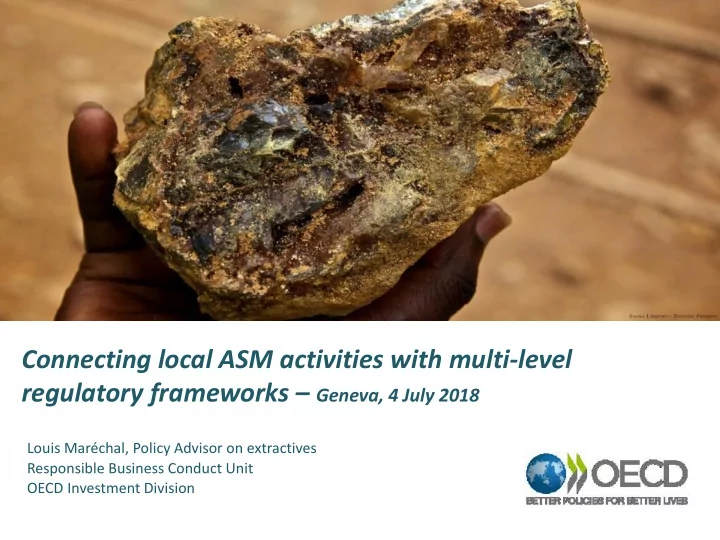

Connecting local ASM activities with multi-level regulatory frameworks – Geneva, 4 July 2018 Louis Maréchal, Policy Advisor on extractives Responsible Business Conduct Unit OECD Investment Division
Addressing conflict and serious human rights abuses in mineral supply chains • Exploitation and trade of mineral resources is a source of growth, but can be associated with significant adverse impacts, including – Serious human rights impacts (e.g. child labour, forced labour) – Financing conflict – Money-laundering, terrorist financing & sanctions violations – Bribery • Global issue (Africa, Asia, Latin Artisanal gold from the Democratic Republic of America, Europe) the Congo • • Informally and/or illegally mined Affects all mineral resources (tin, • Estimated annual output: ~15 tonnes (low estimate) tantalum, tungsten, gold, cobalt, • 98% estimated to be smuggled out; 65% of mines precious stones, coal, oil & gas, etc.) recorded presence of illegal armed groups • For mining, affects to different • Estimated market value: $570 million extent ASM and LSM
Responsible mineral supply chains Global support for OECD Due Diligence Guidance (2011) Industry & Legal & Political Consumer regulatory • Consumer campaigns and • Section 1502 of U.S. Dodd- • G8 (2007, 2008, 2009, 2011, civil society (e.g. Amnesty Frank Act conflict minerals 2013) Int’l, Global Witness, Human reporting • UN Security Council Rights Watch, PAC, Enough • EU regulation on responsible Resolutions on DRC (2009, Project) mineral supply chains 2010, 2011, 2012, 2013, 2014, 2015, 2016) Ivory Coast (2013, • Industry : EICC (electronics), • Legal requirement in DRC, 2014, 2015) and CAR (2016) AIAG (automotive), AIA Rwanda, Burundi & Uganda (aerospace) LBMA, RJC & • ICGLR Heads of States WGC (gold & jewellery), • Conflict Minerals Bill in Lusaka Decl. (2010) CCCMC (China), and DMCC Canada (Dubai) • OECD Council • Relevant legislation on Recommendation (2011) modern slavery & child OECD-benchmarked industry labour (e.g. UK & US) audits cover ~85-90% of total • EU Parliament; CSR strategy refined gold production + Commissioners statement • China national standard & on raw materials OECD-benchmarked industry decrees ( forthcoming ) audits cover ~93% Ta, ~75% Sn, ~60% W production • China-OECD Programme of Work
OECD Due Diligence Guidance for Responsible Mineral Supply Chains Objective To provide clear, practical guidance for companies to ensure responsible operations and sources of supply: No support to non-state armed groups, No “serious abuses” Prevent & mitigate support to public security forces , bribery , tax evasion , money-laundering and fraud in supply chains Strengthen internal controls, due diligence systems, engagement with suppliers (e.g. supplier upgrading) Method and scope 5-step risk-based due diligence process , applies to all mineral resources & all companies throughout the entire mineral supply chain that potentially contribute to conflict, serious abuses, bribery, tax evasion and money laundering through mining or mineral sourcing practices Principles Progressive improvements over time and good faith and reasonable efforts promoting constructive engagement with suppliers Global scope - intended to enable investment and trade in conflict-affected and high-risk areas , i.e. no blacklists, no embargoes, no protectionism
“Whole of supply chain” due diligence e.g. simplified metal supply chain “Upstream” companies: “Downstream” companies: Establish traceability or chain of custody to Identify gold refiners in supply chain mine of origin (Collect information on their upstream For “red flagged” supply chains, undertake on - due diligence (e.g. both through the-ground assessments of mines, producers individual efforts and industry auditing) & traders for conflict, serious abuses, bribery, Use collective industry leverage to tax evasion, fraud, money-laundering encourage improvement of upstream Collaborative engagement with local gov’t, due diligence CSOs, local business to prevent & mitigate impacts, monitor
OECD Guidance and artisanal and small-scale mining (ASM) ASM has a key role, can drive sector-wide changes in responsible sourcing The Guidance enables market access through collaborative efforts of all actors involved Detailed Appendix on ASGM provides roadmap to create economic and development opportunities for artisanal miners, All stakeholders (e.g. OECD Secretariat released in governments, industry, civil May 2016 an ‘’ASM FAQ’’ to society) encouraged to use the clarify expectations of the suggested measures in the Guidance with regard to Appendix responsible ASM engagement by int’l private sector 6
Global implementation of OECD Due Diligence Guidance Implementai 7
Increasing engagement / cooperation with other international organisations Formalisation of ASM & Law enforment / customs combating child labour Transparency / government capacity building initiatives
For further information on the OECD’s work on Responsible Business Conduct OECD Due Diligence Guidance for Responsible Supply Chains of Minerals from Conflict-Affected and High-Risk Areas FAQ on sourcing gold from artisanal and small scale miners Gold industry and sector initiatives for the responsible sourcing of minerals (2014) Mineral supply chain and conflict links in Eastern Democratic Republic of Congo Report on due diligence in Colombia's gold supply chain OECD Council report on the implementation of the due diligence guidance Contact: louis.marechal@oecd.org
Recommend
More recommend